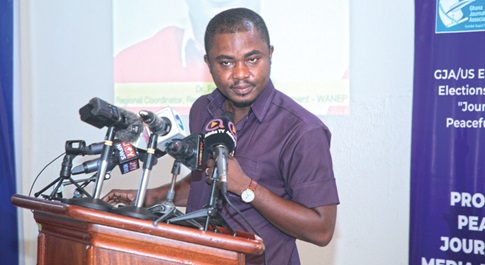
Reject politics of division for peaceful elections - Dr Aubyn urges media
The Regional Coordinator in charge of Research and Capacity Building of the West Africa Network for Peacebuilding (WANEP) has urged media practitioners to take proactive steps to promote healthy civil discourses to safeguard Ghana’s democracy as the 2024 elections draw closer.
Dr Festus Kofi Aubyn said the media must heed the early warning signs of potential violence and stop acts that could undermine the integrity and peaceful conduct of the elections.
“As we reflect on the early warnings and matters arising for the 2024 elections, we cannot overlook the importance of fostering a culture of tolerance and respect. We must commit to civil discourse and reject the politics of division,” he said.
Promote healthy environment
Delivering the keynote address on peaceful journalistic discourse for media practitioners and stakeholders’ workshop in Accra last Wednesday, Dr Aubyn said by promoting transparency, inclusivity, accurate and conflict-sensitive reporting and embracing technology responsibly, the media could help ensure that the electoral process and outcomes reflected the will of the Ghanaian people.
“Together, we can ensure that the upcoming election is a testament to our commitment to democracy and a reflection of our shared aspirations for a prosperous and united Ghana,” he said.
The workshop, held on the theme Promoting Peaceful Journalistic Media Platforms Ahead of Election 2024 (Journalists for Peaceful Discourse)”, aims to promote violence-free and credible elections in Ghana through well-informed and trained journalists who use best practices for fact-based and non-partisan election reporting.
It was organised by the Ghana Journalists Association (GJA) in collaboration with the United States Embassy in Accra.
Speaking on the topic: “Early warning and matters arising: Election 2024”, Dr Aubyn noted that Ghana had long been hailed as a beacon of democracy in Africa.
He mentioned the country’s peaceful transitions of power, vibrant political discourse, robust civil society and vibrant media as developments that had set Ghana apart in the West Africa region.
In his view, one of the most pressing concerns was the issue of electoral integrity which was paramount for maintaining public trust in the process.
“The early warning data of WANEP has persistently highlighted the issue of trust deficits in state institutions that play key roles in the conduct and adjudication of election disputes such as the Electoral Commission, the police and the Judiciary.
“Of particular concern is the mistrust of the main opposition towards the EC. It is important to note that the credibility of the elections and acceptance of its outcomes will largely depend on the actions and inaction of the main electoral body, the EC, as well as the political parties,” he said.
He, therefore, urged the EC to operate with transparency and accountability and frequently engage, and share information with all stakeholders, including political parties, civil society, media and the electorate to build trust in the electoral process and promptly respond to any concerns.
Responsible reportage
The GJA President, Albert Dwumfour, said he was happy the partnership between the association and the US Embassy would help to shape the media environment and build the capacity of practitioners to engage in positive reportage ahead of the December elections.
“The GJA believes that freedom of expression does not only mean allowing people to speak but also ensuring responsibility, knowing there is a need to protect the very space used for free speech,” he said.
